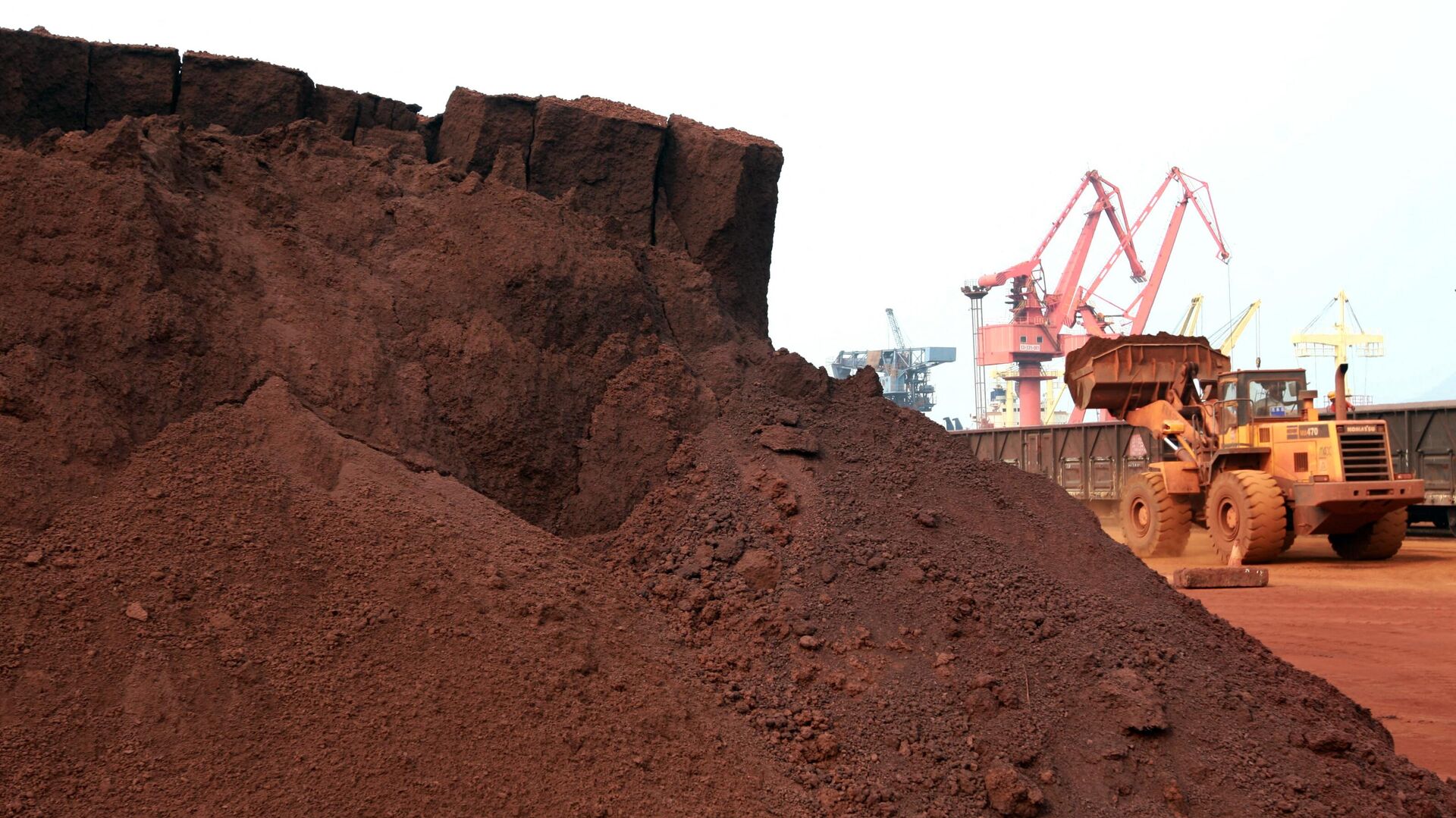https://sputnikglobe.com/20230924/us-admits-inability-to-cut-china-from-critical-mineral-supply-chains-1113620653.html
US Admits Inability to Cut China From Critical Mineral Supply Chains
US Admits Inability to Cut China From Critical Mineral Supply Chains
Sputnik International
China earlier banned exports of its rare earth metals to the US, including gallium and germanium, which are used to build computer chips and solar batteries, among other things.
2023-09-24T11:22+0000
2023-09-24T11:22+0000
2023-09-24T14:40+0000
us
china
minerals
trade
rare-earth metals
restrictions
relations
economy
https://cdn1.img.sputnikglobe.com/img/07e7/09/18/1113625299_0:0:3189:1793_1920x0_80_0_0_b80efc76e52b6c7c8edba8c8dbf99759.jpg
Washington won’t be able to remove China from the critical minerals supply chain, US Under Secretary for Economic Growth and Environment Jose Fernandez has said.According to Fernandez, China’s important role in the processing of raw minerals means that Beijing will remain a key US partner, not least because those minerals are crucial components for the batteries that power electric vehicles (EVs). The broader use of EVs is part of the Biden administration’s strategy to tackle climate change.He recalled that China remains the world’s second-largest economy, calling the PRC “a major trading partner of the US.” Fernandez pledged that the US would continue working with China “while pursuing our interests and protecting our companies and criticizing them when we feel they should be criticized.”Earlier this year, Beijing banned the export of rare earth metals such as gallium and germanium, which are used in the manufacturing of advanced microchips and solar batteries. The move came in response to Washington’s efforts to cut Beijing out of the high-tech economic race.In a separate development, the Chinese Foreign Ministry expressed concern during US Treasury Secretary Janet Yellen’s four-day visit to the country this summer over Washington’s trade restrictions, export controls and the pressure exerted on China that affected the country's market and "undermined the basis of public opinion in bilateral relations."The 2023 US National Intelligence Strategy, meanwhile, sees China as “the only US competitor with both the intent to reshape the international order and, increasingly, the economic, diplomatic, military, and technological power to do so."
china
Sputnik International
feedback@sputniknews.com
+74956456601
MIA „Rosiya Segodnya“
2023
Oleg Burunov
https://cdn1.img.sputnikglobe.com/img/07e4/09/0b/1080424846_0:0:2048:2048_100x100_80_0_0_3d7b461f8a98586fa3fe739930816aea.jpg
Oleg Burunov
https://cdn1.img.sputnikglobe.com/img/07e4/09/0b/1080424846_0:0:2048:2048_100x100_80_0_0_3d7b461f8a98586fa3fe739930816aea.jpg
News
en_EN
Sputnik International
feedback@sputniknews.com
+74956456601
MIA „Rosiya Segodnya“
Sputnik International
feedback@sputniknews.com
+74956456601
MIA „Rosiya Segodnya“
Oleg Burunov
https://cdn1.img.sputnikglobe.com/img/07e4/09/0b/1080424846_0:0:2048:2048_100x100_80_0_0_3d7b461f8a98586fa3fe739930816aea.jpg
us under secretary for economic growth and environment jose fernandez, climate change, us-china trade relations, critical minerals supply chain
us under secretary for economic growth and environment jose fernandez, climate change, us-china trade relations, critical minerals supply chain
US Admits Inability to Cut China From Critical Mineral Supply Chains
11:22 GMT 24.09.2023 (Updated: 14:40 GMT 24.09.2023) Beijing earlier banned exports of its rare earth metals to the US, including gallium and germanium, which are used to build computer chips and solar batteries, among other things.
Washington won’t be able to remove China from the critical minerals supply chain, US Under Secretary for Economic Growth and Environment Jose Fernandez has said.
“This is not about China. We are perfectly happy to work with them on this and right now we purchase many of the minerals from Chinese companies. It’s about diversifying,” he underscored.
According to Fernandez, China’s important role in the processing of raw minerals means that Beijing will remain a key US partner, not least because those minerals are crucial components for the batteries that power electric vehicles (EVs). The broader use of EVs is part of the Biden administration’s strategy to tackle
climate change.
“The world needs them to be involved — the broader picture is climate change, and we’re not going to solve the climate crisis without the involvement of the PRC [the People’s Republic of China],” the US under-secretary stressed.
He recalled that China remains the world’s second-largest economy, calling the PRC “a major trading partner of the US.” Fernandez pledged that the US would continue working with China “while pursuing our interests and protecting our companies and criticizing them when we feel they should be criticized.”
Earlier this year, Beijing banned
the export of rare earth metals such as gallium and germanium, which are used in the manufacturing of advanced microchips and solar batteries. The move came in response to Washington’s efforts to cut Beijing out of the high-tech economic race.
In a separate development, the Chinese Foreign Ministry expressed concern during US Treasury Secretary Janet Yellen’s four-day visit to the country this summer over
Washington’s trade restrictions, export controls and the pressure exerted on China that affected the country's market and "undermined the basis of public opinion in bilateral relations."
Yellen's visit took place amid increased economic and financial contradictions between Beijing and Washington. The main irritants are the growing restrictions on exports of US goods and services, the persistence of import duties on Chinese goods, Washington's threats against Beijing over China’s cooperation with Moscow, the growth of world trade in yuan currency and the decreased influence of the US dollar across the globe.
The 2023 US National Intelligence Strategy, meanwhile, sees China as “the only US competitor with both the intent to reshape the international order and, increasingly, the economic, diplomatic, military, and technological power to do so."





